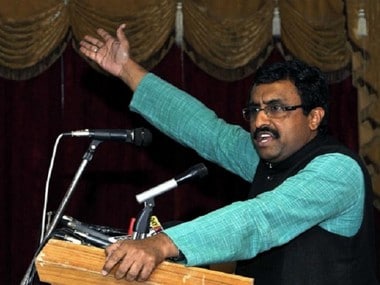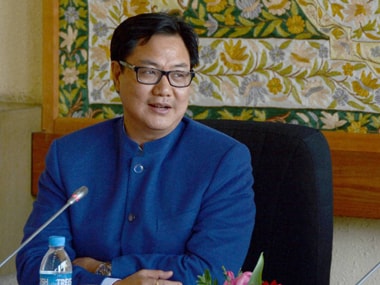A little under two years ago, Himanta Biswa Sarma completed a remarkable political turnaround of sorts when he was sworn in as Minister for Education, Health and Finance for the state of Assam. Only a few months prior, he had been a member of the Congress and a minister in the Tarun Gogoi government. With Tripura, Meghalaya and Nagaland set to find out on Saturday who will form their next governments, Firstpost caught up with Sarma, who firmly believes that the BJP will not just win Tripura, but will also be part of the ruling coalitions in Meghalaya and Nagaland. He feels the Congress is losing its grip on the North East because all its top regional leaders have joined the BJP.
Edited excerpts of the interview follow:
You have been camping in Tripura. How has the campaign been so far, compared to what it was like in your own state of Assam?
First of all, the BJP is winning Tripura for sure and will most likely be part of the ruling coalition in Meghalaya and Nagaland too. The campaign in Tripura has been different in terms of the Opposition. The CPM in Tripura has had a violent history. The challenge has been to reach to the grassroot-level where the Left has penetrated.
Has the Communist rule in Tripura proven to be a challenge, relative to the other states in the region?
The point of view is two-fold. The long Communist rule is a challenge in the first place, but it also has the effect of anti-incumbency, which works to our advantage. The conservative level of development by the Left government also works in our advantage. The aspiration levels of the people itself are very low, which is not a challenge but an advantage to us. Also, the visits by Prime Minister Narendra Modi have instilled confidence in the people of Tripura. People are now aware of the fact that the Union government has been sending funds to the state but the Left government in the state hasn't been passing the benefits on to the people.

File image of Himanta Biswa Sarma. Twitter @himantabiswa
Tripura also saw a series of political murders, which hasn't been the case in any other state in the region. Why do you think this has been happening in Tripura?
Not just political murders, but political rape and molestation too has been a part of Communist culture. This is something that is not common only in Tripura, but everywhere the Left parties have been in power. It is a common phenomenon in Kerala and has been so in West Bengal too. This is something that emanates from their ideology. They use political violence as a tool to silence their political opponents.
Even though this is the general practice of Left parties, they were able to do this to a greater degree in Tripura because the state has been out of the focus of the national media. Such cases in Kerala are covered in the national media but ignored in Tripura. It is because of these tactics and ignorance by national media, that the CPM could rule the state for 24 years.
What are the developmental challenges the BJP is facing in the states where it has come to power like Assam and Manipur? And how does it plan to overcome them?
Different states have different challenges. In Assam for instance, the challenge is not only development but of identity too. There, roads and development are not core issues, but saving the land from foreigners is a relatively more important issue. In Manipur, along with development, unity and harmony among different communities of the state — the Nagas, the Kukis and the Meiti —
is also an important challenge. Balancing interests of the hill and valley populations remains an important consideration in the state, along with restoration of the Law and Order situation there.
In Tripura, the major challenge for the BJP will be the crumbling economy of the state. But the state has huge potential in terms of economic development. The state is just 60 kilometres away from the port of Chittangong in Bangladesh. It can be a beneficiary of the upcoming rail and road link projects between India and Bangladesh. Another challenge in the state is with respect to unity of Bengali and tribal populations and their interests. But I am confident that the BJP will do well on all counts when it comes to power in Tripura.
States like Meghalaya and Tripura have remained massively underdeveloped, even after sufficient funding from the Centre. What do you think is the cause of this?
In Tripura, the problem with the Left ideology is that the meaning of development is very different. For them, development of railways and highways has no meaning. Therefore, in Tripura the Left rule is to be blamed solely for the underdevelopment of the state. In Meghalaya too, there is an immense potential, but the problems are very different from Tripura. The political leadership in the state has been busy serving the party high command in Delhi.
Do you think that the BJP has been able to reconcile its national ideology and policy with its policy for the region?
The BJP is a party that is very much rooted in the ideology. In the North East, the issues are very localised and different. In the BJP, we recognise such diversity and we are accommodating in our approach. In the North-East Democratic Alliance, we have accommodated the interests of regional parties and the people they represent. The BJP's ideology is that of unity in diversity and we don't shy away from recognising the special cultures of smaller communities.
Do you think that the Congress is now a relevant political opponent for the BJP in the region and otherwise?
The Congress is certainly losing its grip on the region very quickly. The tribal population in the state, irrespective of religious affiliation, is gradually siding with the BJP. The Congress party has no leaders left in the region. All the important leaders have left the party and have joined the BJP. Hence, I think that the Congress is no longer a viable political force in the region.
Since the region shares its border with Bangladesh and China. What do you think are the security and cross-border terror concerns?
We have to acknowledge the fact that the since the assumption of power in Bangladesh by the Awami League and Sheikh Hasina, there have been absolutely no cross-border security concerns in the region from Bangladesh. With China, we have had a few problems, but we are slowly coming to terms with the fact that ultimately, we have to live together and China is also realising the same.
I don’t consider the region being at the frontier as a challenge, but instead it's an asset for us. The geographical location is a blessing. The region can serve as a capital for India's South East Asia policy. The immense possibility of trade with China, Myanmar and Bangladesh is there and needs to be worked on.
Published Date: Mar 01, 2018 10:46 AM | Updated Date: Mar 01, 2018 10:46 AM


